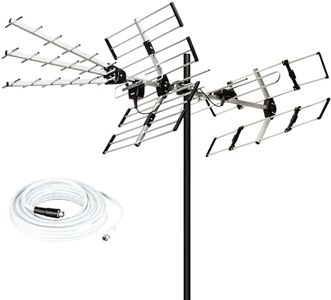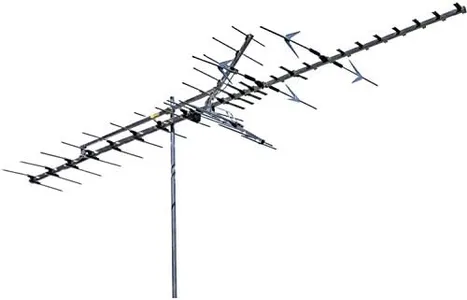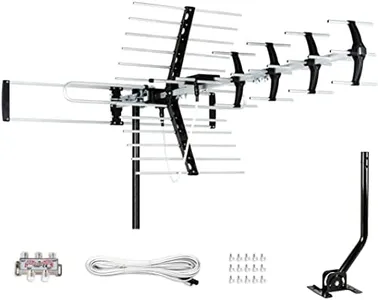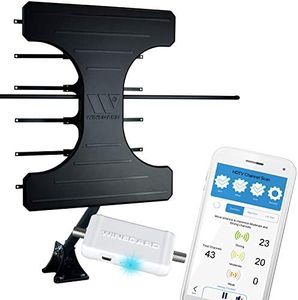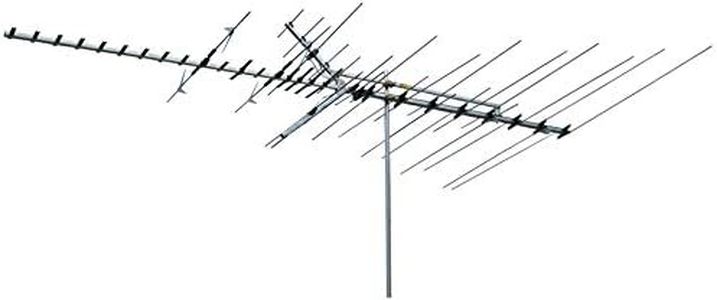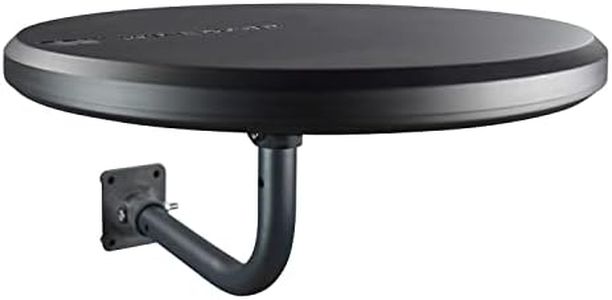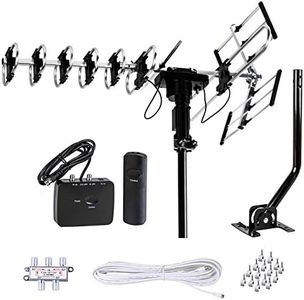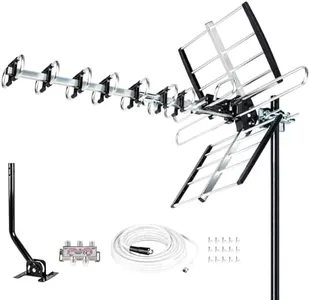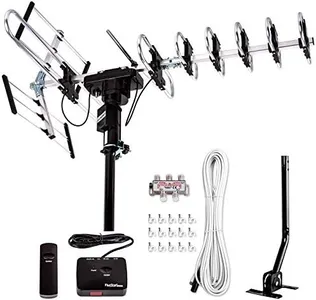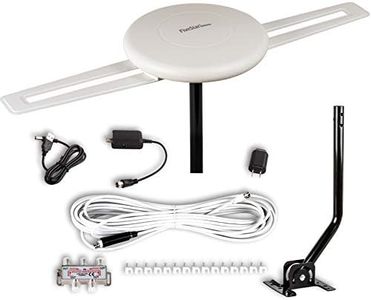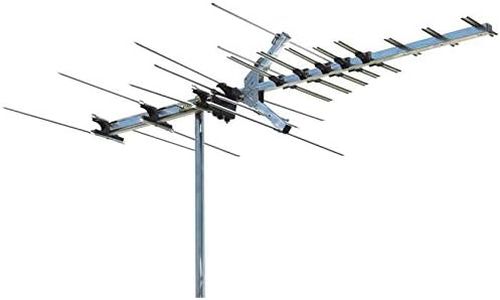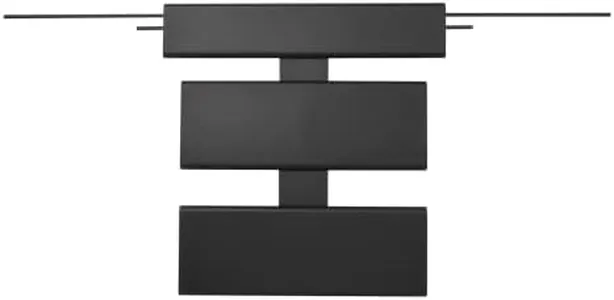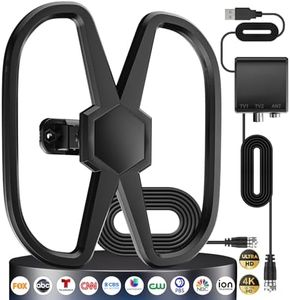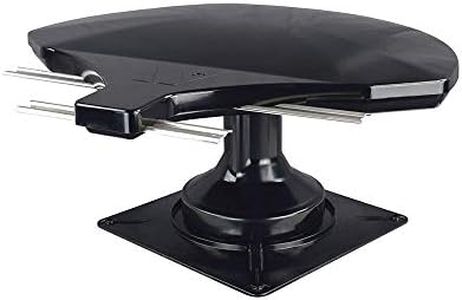10 Best Outdoor TV Antennas 2026 in the United States
Our technology thoroughly searches through the online shopping world, reviewing hundreds of sites. We then process and analyze this information, updating in real-time to bring you the latest top-rated products. This way, you always get the best and most current options available.

Our Top Picks
Winner
Winegard HD7698A Long Range Outdoor HDTV Antenna - 65+ Mile Range, High-VHF/UHF, 4K Ultra-HD Ready, Free Local Channels, Amplify with Boost XT LNA-200
Most important from
486 reviews
The Winegard HD7698A is a long-range outdoor HDTV antenna designed to capture both High-VHF and UHF signals, making it a solid choice for those looking to receive local channels without a cable subscription. With a claimed range of over 65 miles, it is particularly beneficial for users in rural areas where signal strength is often a challenge. The antenna is engineered to ensure efficient signal transfer, which is a significant advantage for maintaining a clear picture quality, especially when combined with the optional Winegard Boost XT LNA-200 amplifier for enhanced performance.
This model supports 4K Ultra HD signals and is designed to be future-ready for the ATSC 3.0 standard, allowing for advanced features like improved frame rates and 3D television viewing. This makes it appealing for tech-savvy consumers who want to be ahead of the curve with their home entertainment systems.
One noteworthy strength is Winegard's reputation as a reliable manufacturer, having been in the antenna business since 1954, which gives potential buyers confidence in its quality and durability. Additionally, the antenna is built for weather resistance, ensuring it can withstand various outdoor conditions. The installation process may be challenging for some users, particularly those unfamiliar with mounting outdoor devices. Some customers have noted that performance can vary depending on geographic location and obstructions like trees or buildings, which could limit the effective range.
Most important from
486 reviews
Five Star Outdoor HDTV Antenna up to 200 Mile Long Range, Attic or Roof Mount, Digital OTA Antenna for 4K 1080P VHF UHF Supports 4 TVs Installation Kit & J Mount, ATSC 3.0 Ready
Most important from
1297 reviews
The Five Star Outdoor HDTV Antenna is designed for users looking to cut cable costs while enjoying free HD and 4K TV channels from over-the-air signals. It offers a very long range—up to 200 miles—which is impressive for most locations, though actual reception depends on obstacles like trees and buildings. The antenna supports both VHF and UHF frequency bands, which means it can pick up a wide variety of channels including local news, sports, and entertainment. Its multi-directional design helps capture signals from multiple directions without needing to be constantly adjusted.
The physical size is fairly large, with extended antenna elements aimed at providing stable and strong reception. The package includes all necessary mounting hardware and a TV splitter, making it flexible for roof, attic, or pole installation. It is also weather-resistant, suitable for outdoor use throughout the year. Signal quality may vary based on your specific location and setup, so some users might need to experiment with placement.
This antenna is a strong choice for those wanting a dependable, long-range solution that supports current and future broadcast standards (ATSC 3.0) and can serve multiple TVs.
Most important from
1297 reviews
Winegard Elite Pro Outdoor VHF/UHF HDTV Antenna with Bluetooth Signal Meter and Integrated Channel Finder, Up to 70 Mile Range
Most important from
771 reviews
The Winegard Elite Pro is a solid choice if you want to pick up free HDTV channels from up to 70 miles away. It’s a directional outdoor antenna, which means you’ll need to point it toward the broadcast towers for the best signal. This antenna supports both VHF and UHF frequencies, so it covers the main TV bands. One of its standout features is the built-in Bluetooth signal meter and an app that guides you through the setup process, making it easier to find the best position without guesswork.
The 20dB amplifier helps boost weak signals, which is great if you’re farther from towers or live in an area with obstacles. The product is fairly large (about 30 inches long), so you’ll want to make sure you have a stable mounting spot outdoors. Weather resistance is good for typical outdoor use, but like most antennas, proper installation is key to durability.
This antenna is a practical option for those who want reliable long-range reception and don’t mind spending a bit of time on installation with the help of the app. It’s especially useful if you’re interested in free 4K UHD channels and want a bit of tech help in setting it up.
Most important from
771 reviews
Buying Guide for the Best Outdoor TV Antennas
When shopping for an outdoor TV antenna, your main goal is to find one that captures as many channels as possible with consistent quality, based on where you live. Antennas can differ greatly in terms of how far they reach, how many directions they pick up signals from, and how well they stand up to outdoor conditions. To pick the best fit, think about your location, the distance to the nearest broadcast towers, and any obstacles (like tall buildings or hills) that might interfere with signals. It's also important to consider how you plan to mount the antenna and whether you want to set it up for multiple TVs.FAQ
Most Popular Categories Right Now
